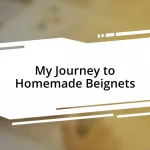Key takeaways:
- NOLA’s food festivals celebrate culinary diversity, showcasing Creole, Cajun, and global influences through unique dishes.
- Local ingredients enhance flavor, promote sustainability, and support the community, creating a deeper connection between food and culture.
- These festivals foster community relationships, allowing people to bond over shared culinary experiences and personal stories.
- Chefs in NOLA inspire creativity and innovation by transforming ingredients and celebrating heritage, encouraging others to experiment in their own cooking.
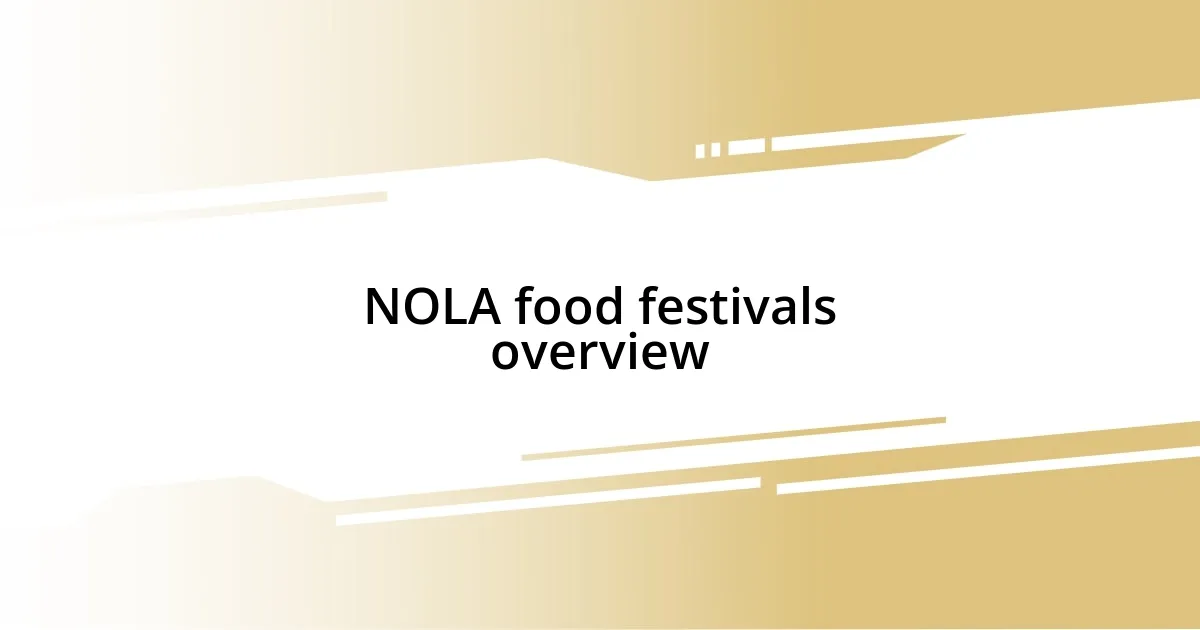
NOLA food festivals overview
New Orleans is a melting pot of cultures, and its food festivals beautifully reflect this vibrant heritage. From the mouthwatering smells of gumbo to the sweetness of beignets, each festival offers a sensory feast. Have you ever walked through the bustling streets during one of these events, your senses overwhelmed by the culinary delights? It’s an experience like no other.
I remember attending the New Orleans Jazz & Heritage Festival, where the rhythm of music met the heart of local cuisine. As I savored a plate of crawfish étouffée, I felt connected to the history and passion behind this dish. It’s not just about food; it’s about sharing stories through flavors. Isn’t it fascinating how a single bite can transport you to the soul of a city?
The energy at these festivals is palpable, creating a communal atmosphere that invites everyone to join the celebration. Whether you’re a local or a visitor, there’s a sense of belonging that unites us all over a shared love for food. Have you ever found yourself chatting with strangers over a bowl of jambalaya, bonding over the joy of good eats? That’s the magic of NOLA food festivals—they inspire camaraderie, creating lasting memories flavored with laughter and connection.
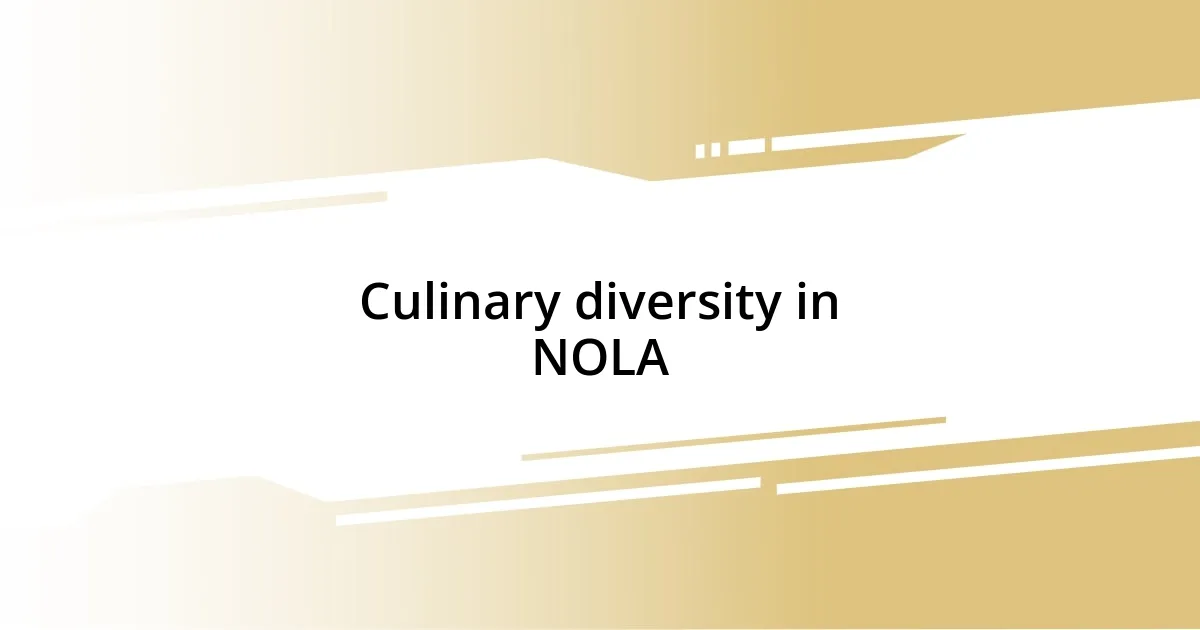
Culinary diversity in NOLA
The culinary diversity in New Orleans is truly remarkable and showcases a blend of traditions from various cultures. Every dish tells a story, whether it stems from Creole, Cajun, African, French, or Spanish influences. I vividly recall the first time I tried a plate of red beans and rice at a food festival; the heartiness of the dish, combined with the spices, lingered on my palate long after. It felt like tasting a piece of history, a reflection of the community’s resilience and creativity.
Here are some key aspects that highlight NOLA’s culinary diversity:
– Creole and Cajun Roots: These two distinct cultures bring unique flavors and cooking techniques to the table.
– Global Influences: With immigrant populations, dishes like pho and tamales seamlessly blend into the local fare.
– Seafood Richness: With an abundance of fresh seafood, dishes like jambalaya and po’boys highlight coastal flavors.
– Seasonal Festivals: Events centered around particular dishes or ingredients, like the Crawfish Festival, celebrate local food traditions.
– Fusion Cuisine: Chefs experiment, integrating global flavors into traditional dishes, resulting in innovative creations.
Every festival visit leaves me inspired, showcasing just how food can unite diverse cultures and create an unforgettable tapestry of flavors.
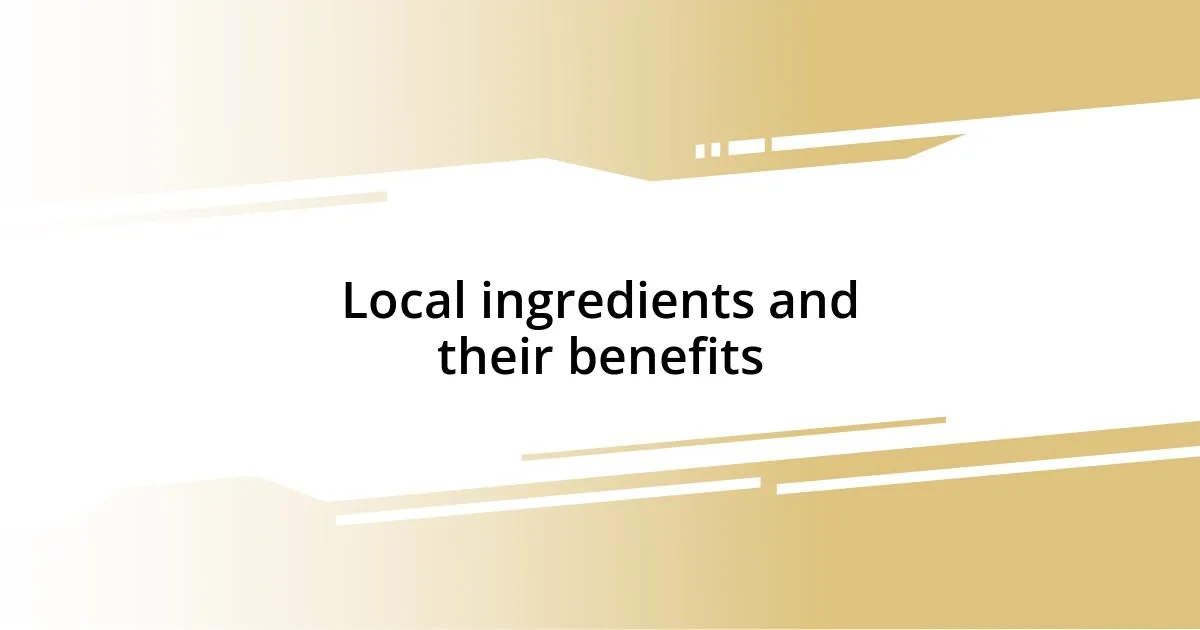
Local ingredients and their benefits
Local ingredients serve as the backbone of New Orleans’ culinary scene, providing depth and authenticity to every dish. I’ve often marveled at how using locally sourced produce, seafood, and meats not only enhances flavor but also promotes sustainability. For instance, during a recent visit to a food festival, I savored a vibrant salad made with heirloom tomatoes from a nearby farm; each bite burst with fresh flavor that simply couldn’t be replicated with out-of-state ingredients.
One of the most touching experiences I’ve had was meeting the farmers behind the ingredients. Their passion for nurturing the land shines through in their produce. It made me appreciate how intertwined our local food systems are with community livelihoods. Supporting local means we’re not just enjoying a meal; we’re celebrating the hard work and dedication of those who grow and harvest our food. Have you ever talked to a farmer about their craft? It adds a personal touch that makes every dish more meaningful.
Utilizing local ingredients also reduces the environmental impact of food miles, making the dining experience more eco-friendly. For example, seafood caught just hours before a festival is not only fresher but also supports the local fishing economy. I distinctly remember tasting a shrimp po’boy where the shrimp were sourced straight from the Gulf. The taste was unlike anything I had before — perfectly sweet and succulent. You can’t help but feel a sense of pride knowing that these ingredients are part of a larger story nestled in the heart of New Orleans.
| Local Ingredients | Benefits |
|---|---|
| Farm-Fresh Produce | Enhances flavor and nutrition |
| Locally Caught Seafood | Supports local economy and offers freshness |
| Grass-Fed Meats | Healthier and more flavorful options |
| Seasonal Ingredients | Encourages sustainability and culinary creativity |
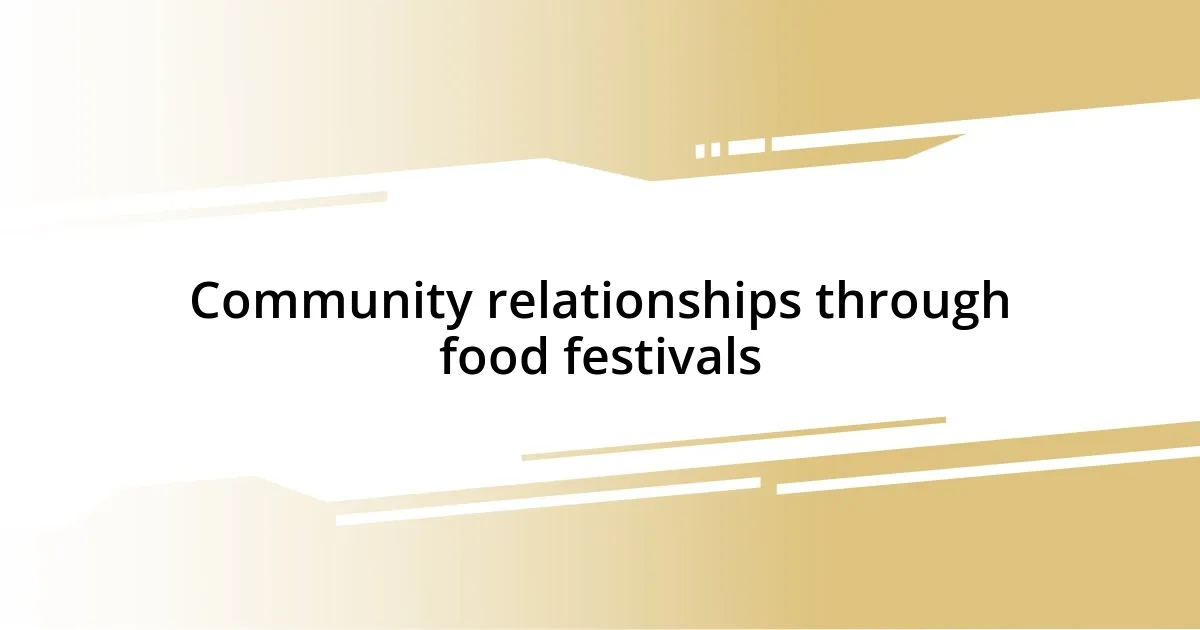
Community relationships through food festivals
Food festivals are a powerful catalyst for building community relationships. I still remember the warmth in the air as I attended the New Orleans Jazz & Heritage Festival, surrounded by locals and visitors alike, all united by a love for good food. Sharing dishes like gumbo and crawfish étouffée, I felt a palpable connection with others. Each conversation over food seemed to spark an understanding of our shared passions and the cultural narratives behind each dish.
One of the most inspiring moments I experienced was witnessing a group of local chefs come together to create a collaborative dish. As they mixed flavors and ideas, I realized how food acts as a bridge between different backgrounds and experiences. It’s thrilling to see how these gatherings let people share their personal stories, opening doors to new friendships while honoring culinary traditions. Have you ever tasted a dish that ignited a conversation? For me, it’s those spontaneous exchanges that transform a meal into a celebration of our diverse narratives.
Moreover, food festivals serve as a platform for local artisans and creators to connect with their community directly. I was touched when a vendor shared how participants’ support allowed them to keep their family recipes alive and thriving. This sense of pride fosters not just consumerism but appreciation for the art of cooking and sharing. The vibrancy of the community at these events reminds me that food is not just sustenance; it’s a shared experience that binds us together, fostering relationships that thrive long after the festival lights dim.

Cultural experiences at NOLA festivals
Attending NOLA’s festivals truly immerses you in a rich tapestry of cultural experience. I remember my first time at the Creole Tomato Festival, where vibrant banners and lively music created an atmosphere that simply pulsated with local identity. Sampling dishes infused with spices and flavors that tell stories of generations past made me feel like I was part of a living history. Isn’t it amazing how food can transport you to a different time and place?
What I love most is the sense of celebration and communal joy that fills the air. I’ve seen families passing down recipes while standing in lines, eagerly anticipating the next bite of authentic jambalaya or beignets coated in powdered sugar. Those moments remind me of my own childhood kitchen, where cooking was an act of love and togetherness. Can food really be a way to understand a culture? Absolutely; it’s a lens through which we can connect deeply with one another.
The artistry on display in NOLA festivals also strikes me every time. Artists and chefs collaborate to elevate simple ingredients into masterpieces. For instance, during the Bayou Boogaloo, I watched a muralist paint a vibrant scene inspired by the local cuisine, while a chef prepared a stunning po’boy for guests. The vibrant colors around me reflected not just on the canvas but in each dish, reinforcing how creativity thrives in this spirited community. Have you ever felt invigorated by the sights and sounds around you? Festivals are where tradition meets innovation, creating a sensory experience that is unforgettable.
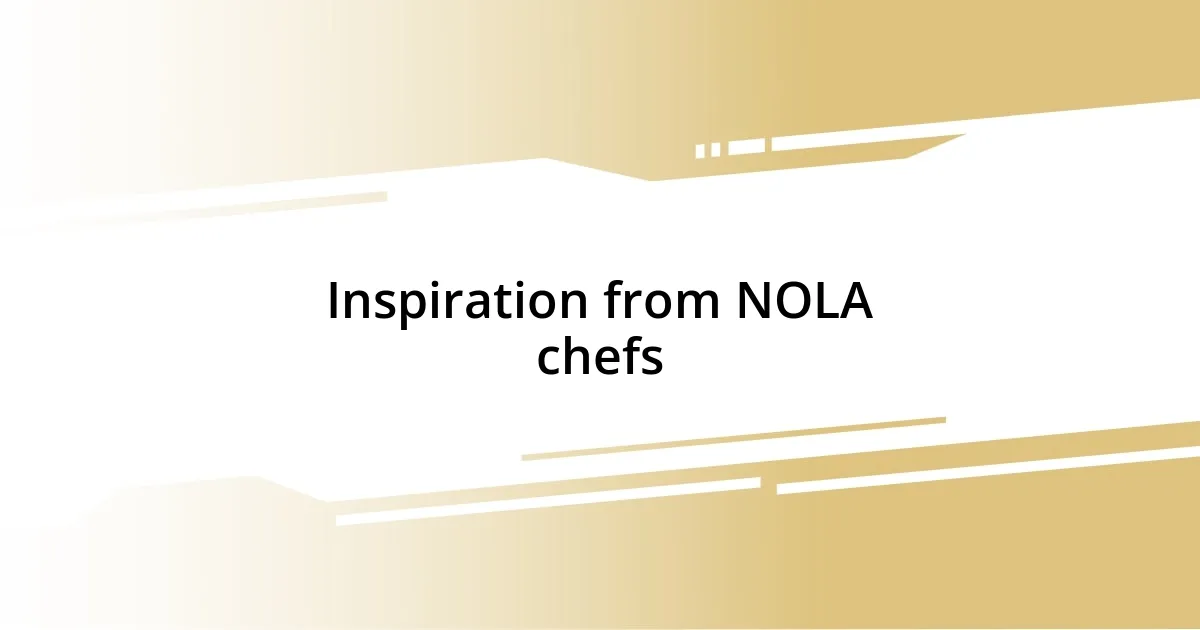
Inspiration from NOLA chefs
I find NOLA chefs to be a constant source of inspiration. Their passion for food is palpable, and witnessing their ingenuity is uplifting. For instance, I once attended a demonstration by a chef who transformed leftover crawfish into a sumptuous étouffée, showcasing not just culinary skills but also a profound respect for minimizing waste. Isn’t it fascinating how creativity can bloom from simplicity?
At a recent festival, I met a chef who shared her journey. She spoke about her grandmother’s cookbooks, filled with handwritten notes and stains from countless meals. Her emotional connection to these recipes brought to life the idea that food isn’t just about ingredients; it’s about heritage and memory. Have you ever tasted a dish that was heavy with nostalgia? That experience reminded me that every chef has a story to tell, one that weaves through time and place.
I once challenged a local chef to craft a dish on the spot, using only what he could find at the festival. Watching him dive into the vibrant ingredients available—aromatics that danced in the air and fresh produce piled high—was like watching an artist at work. The dish he created was a testament to the culinary culture of NOLA, merging tradition with improvisation. It made me think: how often do we allow ourselves the freedom to experiment and create in our own kitchens? The energy of NOLA’s chefs encourages me to embrace innovation and celebrate spontaneity in my cooking.

Personal reflections on festival experiences
Reflecting on my festival experiences, I often recall the warmth of human connection that permeates the air. At one of the oyster festivals, I struck up a conversation with a vendor who passionately described his family’s long history of harvesting oysters from the bayou. Listening to him felt like diving into a treasure chest of local lore. Have you ever felt that rush of excitement when learning something new from someone right in front of you? It’s that kind of exchange that transforms a mere event into a shared cultural experience.
I also find myself reminiscing about the sounds of laughter and storytelling that echo through the festival grounds. During the French Quarter Festival, I watched as strangers gathered around street performers, their faces alight with joy. It reminded me of summer nights spent around a fire pit, where shared stories became the fabric of our relationships. Isn’t it incredible how food can serve as a backdrop to such meaningful interactions? Each bite becomes a part of the narrative shared among friends and family.
Then there are those spontaneous moments that catch you off guard—the first time I tasted a spicy seafood gumbo while perched on a curb, surrounded by friends and street musicians. The flavors danced on my palate, igniting a burst of inspiration. I remember thinking how food has the power to forge memories that linger long after the meal is over. What stories do your meals tell you? Each festival experience is a reminder that food isn’t just sustenance; it’s a celebration of life itself, woven together by the threads of community.










